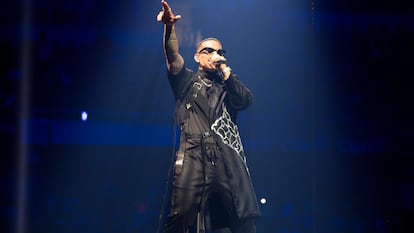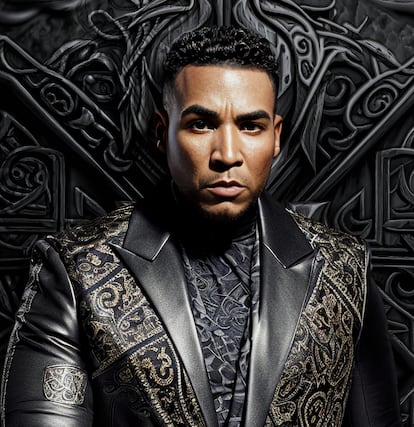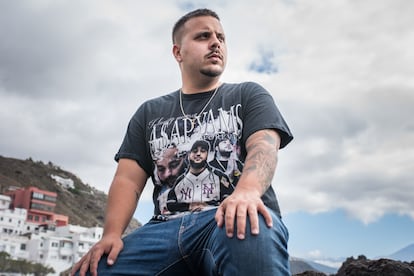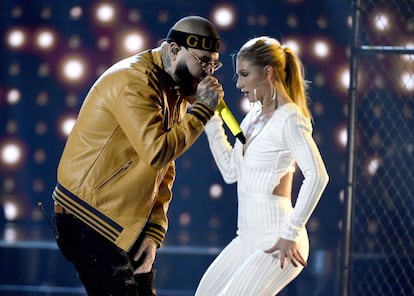For Daddy Yankee, faith triumphs over reggaeton
Declaring ‘Jesus lives in me and I will live for him,’ the Puerto Rican becomes the latest urban music artist to prioritize spirituality over career. Last year, his compatriot Farruko did the same

On December 3, Ramón Luis Ayala Rodríguez, famously known as Daddy Yankee, declared that it was the most important day of his life. In front of a crowd of over 18,000 at the Puerto Rico Coliseum, the singer announced his definitive exit from the world of reggaeton to dedicate his life to Christ. “Tonight, I recognize, and I am not ashamed to tell the whole world that Jesus lives in me and that I will live for him.” Ayala’s declaration highlighted a recent trend among reggaeton performers — blending successful careers with living out their Christian faith. These performers find serenity and purpose through faith, much like musicians that came before them — Bob Dylan, Cat Stevens, Juan Luis Guerra and Peret.
Reggaeton, a genre influenced by reggae, hip hop and dancehall music, became popular among Puerto Rican youth in the 1990s when performers like Vico C, Tego Calderón, Daddy Yankee and Don Omar emerged. Despite facing social prejudices and often overt displays of sexuality, reggaeton broke class barriers and has become a global phenomenon today.
According to Juan Antonio Fernández, a philosophy professor at the Complutense University of Madrid, the contrast between Christian morality and the lack of inhibition displayed by reggaeton singers is not as strange as it may seem. “Reggaeton and religion have more in common than meets the eye. Both serve as socializing forces that facilitate meaningful connections within a community, with emotions playing a significant role in the process.”
Fernández notes that both worlds share a reinforcement of patriarchal structures. Religious practices achieve this by assigning significant roles to men, while downplaying the importance of women. “Reggaeton does this by projecting traditional sexist stereotypes in songs that, for the most part, are sung by men,” he said.
The spiritual conversions of other musical pioneers have paved the way. Panamanian rapper El General retired in 2004 and became a Jehovah’s Witness, while Puerto Rican rapper Héctor el Father also abandoned music to become a pastor.
Spiritual refuge
Hard times often drive people to seek spiritual refuge. Don Omar, a prominent reggaeton singer, began selling drugs on the streets of San Juan at the age of 14. Tragedy struck when he was 16 — two friends were shot to death while Don Omar escaped unharmed. Fearing for his life, he turned to God and found solace in Christianity. In a 2022 interview with Chilean television host Don Francisco, he talked about wondering why he survived while his friends did not. This experience propelled him on a transformative path to become a Protestant pastor for four years, before embarking on his next journey to become the musician named Don Omar.

Fernández says certain patterns emerge in entertainers during times of turmoil, such as experiences of trauma, dissatisfaction or existential voids. Religion is often seen as a means to fill the void and bring a sense of order or purpose to life. “Living a life of success is not the same as living a life with purpose,” said Daddy Yankee. Despite the material wealth of success, the Puerto Rican said his faith in Christ helped fill the “emptiness that I felt for a long time.”
An inherited faith
Some artists practice their faith in a more personal manner, without explicit proselytism. Spanish rapper Cruz Cafuné (Carlos Bruñas) started listening to reggaeton during his teenage years, when it became popular among older kids at his high school. Artists like Tego and Nicky Jam inspired him to embark on a career in urban music. This year, Cruz Cafuné released Me muevo con Dios, an album that often alludes to his faith (“God sometimes disciplines by granting your desires / I want to do everything with love / I give my all in everything I do / God is in everything I do”). Cruz says he prays every single night. He finds the ethical aspect of Christianity especially beneficial, and embraces a personal expression of faith. “I personally think there’s something in every living being. That something is called faith, whether you’re a believer or not. For me, I believe it’s love that drives us all, it’s what makes everything alive. But you can’t really measure it, there’s no love meter or anything like that.”

Cruz inherited his faith from the values instilled in him during his childhood — love, the desire to do good, and the importance of helping his loved ones and community. “I’m quite sure that there are many things I do purely out of faith. But I don’t think there’s a bearded guy in heaven ready to judge me and say, ‘Hey buddy, because of that one mistake you made 40 years ago, you’re going to burn in hell forever.’ I don’t think that’s how it works. Honestly, the prospect of eternal life freaks me out sometimes.”
Beyond reggaeton
In 2021, Farruko released Pepas, a song alluding to illegal drugs that soon became one of the most popular songs of the summer. The singer quickly regretted releasing it and publicly apologized eight months later. “Today, I can honestly say that God is dealing with me. He knows how many of his children I’ve hurt,” Farruko told a Miami audience in February 2022. In an announcement very much like Daddy Yankee’s, Farruko declared his surrender to Jesus and said he was focusing exclusively on Christian music.

December 3, 2023. A cluster of drones covered in LEDs formed a huge cross over the audience at the Puerto Rico Coliseum. On stage, Daddy Yankee looked up at the cross in the sky. “Jesus, thank you for your mercy that allowed me to travel the world. Now, I pray that you enable me to spread the good news from Puerto Rico to the ends of the earth. I’ve finally reached my goal — I am free. Amen.” The drones swirled around in the sky and spelled out Daddy Yankee’s good news for the world: “Jesus loves you.”
Sign up for our weekly newsletter to get more English-language news coverage from EL PAÍS USA Edition
Tu suscripción se está usando en otro dispositivo
¿Quieres añadir otro usuario a tu suscripción?
Si continúas leyendo en este dispositivo, no se podrá leer en el otro.
FlechaTu suscripción se está usando en otro dispositivo y solo puedes acceder a EL PAÍS desde un dispositivo a la vez.
Si quieres compartir tu cuenta, cambia tu suscripción a la modalidad Premium, así podrás añadir otro usuario. Cada uno accederá con su propia cuenta de email, lo que os permitirá personalizar vuestra experiencia en EL PAÍS.
¿Tienes una suscripción de empresa? Accede aquí para contratar más cuentas.
En el caso de no saber quién está usando tu cuenta, te recomendamos cambiar tu contraseña aquí.
Si decides continuar compartiendo tu cuenta, este mensaje se mostrará en tu dispositivo y en el de la otra persona que está usando tu cuenta de forma indefinida, afectando a tu experiencia de lectura. Puedes consultar aquí los términos y condiciones de la suscripción digital.









































